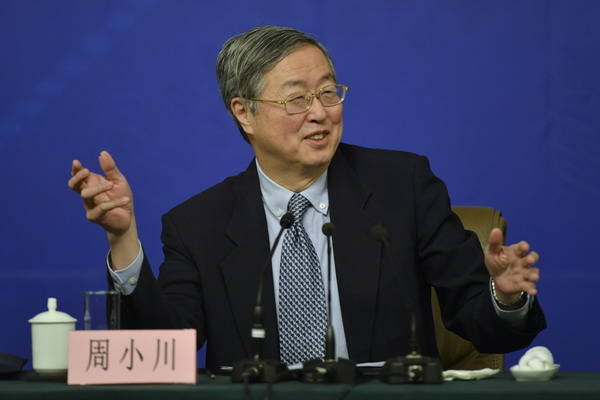 时刻新闻
时刻新闻
Flexible approach may be used as economic conditions warrant, central bank head says

Zhou Xiaochuan, governor of People's Bank of China, takes questions from journalists at home and abroad during an ongoing press conference on March 12, 2015. [Wei Xiaohao / chinadaily.com.cn]
China will not change its prudent monetary policy stance, but would consider adopting a more flexible approach by tilting it toward either a tighter or more easing direction, a top central bank official said on Thursday.
Zhou Xiaochuan, governor of the People's Bank of China, said at a news conference during the annual meeting of the country's top legislature: "The Chinese economy is facing a 'new normal', or a new stage of slower growth than the past few years. But a new normal is still a normal situation, not something special or problematic. So we don't need a new term to define our monetary policy."
He noted that the central bank recently used a number of monetary policy tools that the public is unfamiliar with, such as the standing lending facility, but the volume of liquidity released by each tool was not very huge compared with the size of the Chinese economy.
"Although we used various monetary policy tools, the growth of broad M2 money supply is still moderate. It shows that our prudent monetary policy remains unchanged," he said.
Statistics released by the PBOC on Thursday showed that M2 rose 12.5 percent in February from a year ago, quickening from 10.8 percent in January, which was the weakest since 1998.
Chinese banks extended 1.02 trillion yuan ($162.9 billion) of new loans in February, well above market expectations. For the first two months combined, new lending rose to 2.49 trillion yuan, from 1.96 trillion yuan a year earlier.
Zhou said the central bank has tried to inject more capital into the areas of the economy where structural changes are mostly needed and it will take some time to see an increasingly positive effect of such policies. But he also said the public should not overestimate the impact of liquidity management and base money issuance on the adjustment of economic structure.
Qian Yingyi, dean of the School of Economics and Management at Tsinghua University, told China Daily there is no need for the central bank to ease its monetary policy unless new problems arise in the economy.
"People think monetary policy can work magic in stimulating the economy. But the monetary policy should not play this kind of role. What is more important is the overall economic restructuring, for which the monetary policy can provide a stable environment," said Qian who is also a member of the National Committee of the Chinese People's Political Consultative Conference.
The central bank cut the one-year benchmark lending and deposit rates by 25 basis points respectively on March 1, after it lowered the one-year lending rate by 40 basis points and deposit rate by 25 basis points on Nov 22.
The rate cuts combined were in line with the slowdown of consumer price index growth by 60 basis points to 2 percent in 2014, Qian said.
Other key points at the press conference
1. Silk Road Fund
The fund has finished business registration and started operating. Its job is to select good investment opportunities for development along the routes. There is no hard boundary geographically where the fund is invested, and other programs are welcome to join, as long as there is a definite need for it within the overall framework, said Jin Qi, head of the fund.
2. Hot money
Current capital outflows are not huge. Most are normal and we are always vigilant about any abnormal cross-border flows, said Zhou Xiaochuan, central bank governor
3. US rate rise
A rise in US interest rates will not "threaten" Chinese monetary policy; but it would represent a good sign of recovery in the world economy, said Zhou.
4. Renminbi exchange rate
The renminbi remains relatively stable compared with other currencies. Any fluctuations in its rate are normally influenced by international demand, as the country continues with its opening-up policy. Zhou said that he hopes the currency can soon be included in the Special Drawing Rights created by the International Monetary Fund.
Changes are in store for depositors with bank insurance program
The nation will launch a deposit insurance system during the first half of this year, and it is very likely to fully liberalize interest rates this year, People's Bank of China Governor Zhou Xiaochuan said on Thursday.
Deposit insurance will protect the interests of savers and promote fair competition among large and small banks. It will cap coverage at 500,000 yuan ($79,857) for each client's deposits at each bank. Coverage of that scale will give full protection to 99.6 percent of the nation's depositors, the central bank said.
"We have finished gathering comments from banks on the introduction of the deposit insurance system. The feedback was generally positive. Conditions are ripe for launching the system," Zhou told reporters.
China is only one step away from freeing deposit rates for commercial banks. Effective March 1, the PBOC raised the deposit-rate ceiling to 1.3 times the benchmark rate from 1.2 times previously.
Yi Gang, deputy governor of the PBOC, said that deposit rates now become more differentiated among commercial banks of different sizes.
Some small financial institutions increased their deposit rates by 20 to 30 percent above the benchmark, while large banks only raised their rates by 10 percent. Among foreign-funded banks, 36 percent stuck to the benchmark, Yi said.
"After Chinese financial institutions, households, individuals and companies get accustomed to differentiated interest rates, the conditions for interest rate liberalization will become increasingly ripe," he said.



